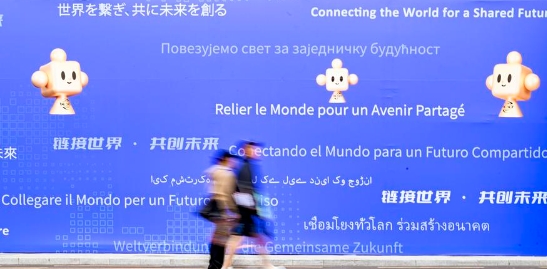China's supply chain expo highlights global push for cooperation, openness

People walk past a poster during the third China International Supply Chain Expo (CISCE) in Beijing, capital of China, July 16, 2025. (Xinhua/Chen Shuo)
As the third China International Supply Chain Expo (CISCE) opened in Beijing on Wednesday, global business executives and officials voiced a collective need to reinforce supply chains through open markets, innovation, and multilateral engagement.
"This event is much more than an expo. It is a forest of connections between economies, industries, and people," John Denton, the secretary-general of the International Chamber of Commerce, said in his speech. "We are here together to advance our shared prosperity."
Denton's remarks echoed a widespread consensus among attendees that building trust and deeper integration -- spanning AI innovation to global manufacturing collaboration -- is essential for effectively navigating the increasing global uncertainties.
Held from July 16 to 20, the 2025 CISCE gathered more than 650 companies and institutions from 75 countries, regions and international organizations, along with over 500 of their upstream and downstream partners.
Foreign exhibitors made up 35 percent of the total participation -- an indicator of enduring business interest in the face of rising geopolitical and economic headwinds.
Hosted by the China Council for the Promotion of International Trade (CCPIT), the expo is the world's first national-level expo dedicated exclusively to supply chains.
In the lead-up to the event, Wang Yiwei, director of the Institute of International Affairs at Renmin University of China, said that active engagement from multinational firms reflects the "continued momentum and irreversibility of globalization."
Wang noted that China, with the world's most complete and largest industrial system, is playing a growing role in driving global development through digital and green transformation -- and is increasingly seen as an innovation lab.
China's expanding role in global innovation ecosystems, especially in AI, was underscored by Nvidia CEO Jensen Huang, who delivered a speech during his first CISCE appearance.
Calling China's supply chain "a miracle," Huang highlighted the country's fast-growing AI technologies and its global reach. "China's open-source AI is a catalyst for global progress," he said, as it enables broader access to innovation and supports international cooperation on standards and safeguards.
In an interview on the sidelines of the expo, Huang reaffirmed Nvidia's long-term commitment to the Chinese market. "If you want to maintain, you have to invest," he said. "The market is moving so fast and it's so competitive -- we have to continue to advance ourselves."
He added that China's technology market is growing rapidly and remains a key focus for the company, calling it "a very important market with dynamic, innovative customers."
The expo comes on the heels of China's announcement of a 5.3 percent economic growth for the first half of the year despite rising challenges and external uncertainties.
"China is entering a new cycle of market opportunity," said Lin Chunmei, president and general manager of Corning Greater China, in an interview with Xinhua. "With the rise of AI and cloud technologies, the AI infrastructure market is growing faster than ever."
She noted that China's steady and resilient economy, along with its stable and open business environment, continues to support the growth of enterprises. "Over the past few decades, we've seen consistent improvements in China's business climate," she added.
At the opening ceremony, the CCPIT and global business representatives issued a joint initiative calling for supply chain stability and security, digital and green transformation, and stronger international cooperation.
Ren Hongbin, chairman of the CCPIT, said the expo has become a platform for China's high-standard opening up, urging collective efforts to safeguard multilateralism and build a more interconnected future.
Editor:伏娅敏
